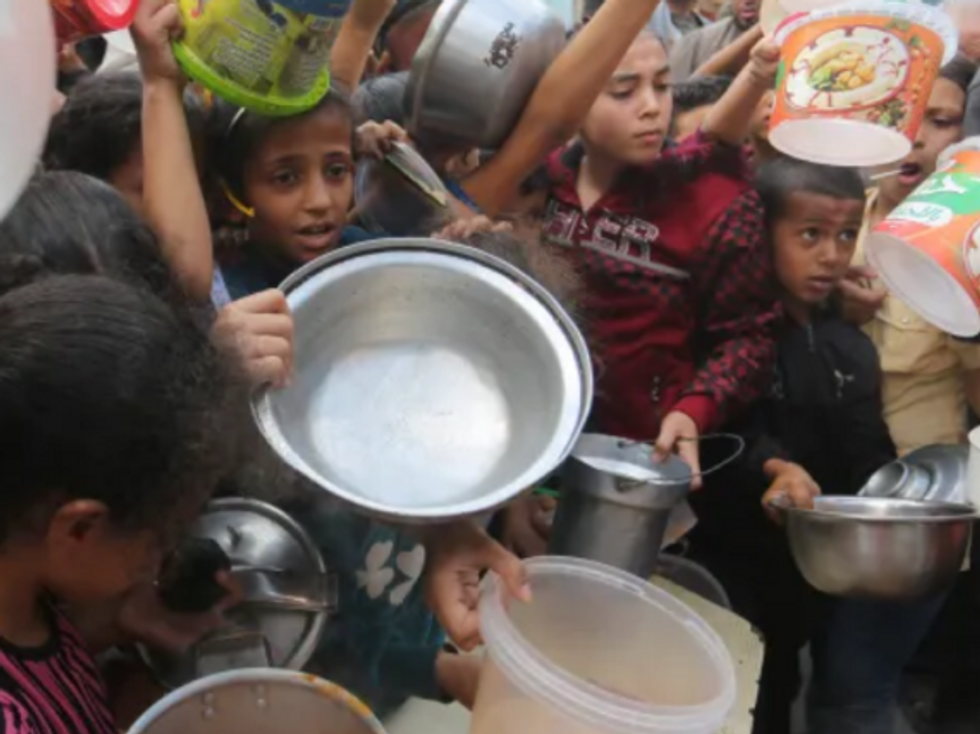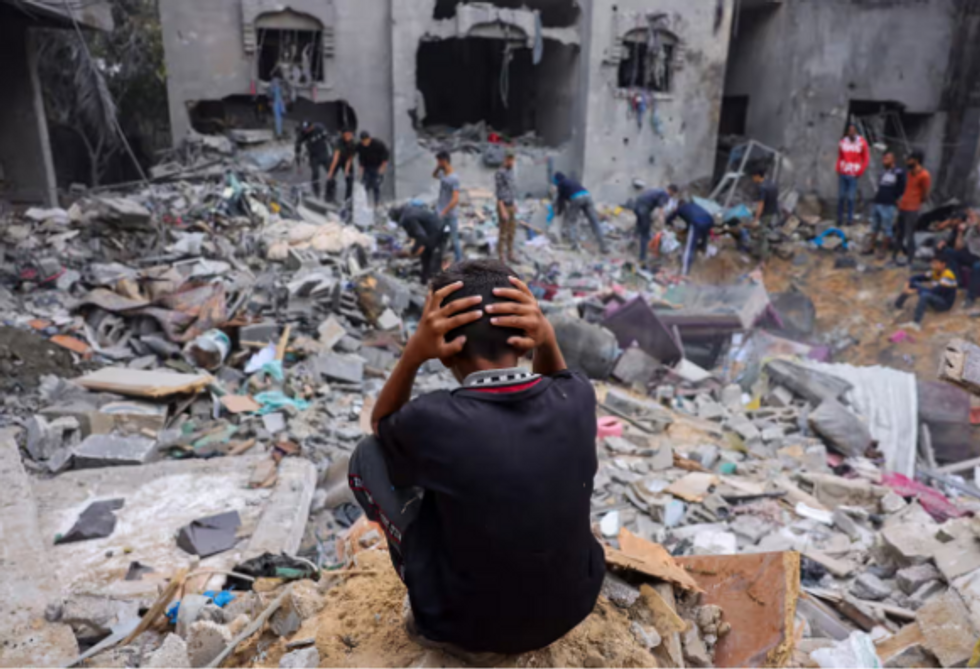
This Armistice Day, Kurt Vonnegut - humanist, socialist, chronicler of war's "terrible wastefulness" - would have turned 101; he deemed "sacred" the date when millions laid down their arms in a singular, merciful moment of grace. This Armistice Day, Gaza saw no mercy or grace - just hospitals gone dark, nurses shot, patients trapped, babies "dying by the minute." Mournfully, the devastation evokes Vonnegut's fury at another awful war in 1969. "We have nothing to celebrate," he said. "Let the killing stop."
It was on the 11th hour of the 11th day of the 11th month of 1918 that "millions upon millions of human beings stopped butchering one another," Vonnegut wrote of the Armistice. "I have talked to old men who were on battlefields during that minute. They have told me in one way or another that the sudden silence was the Voice of God. So we still have among us some men who can remember when God spoke clearly to mankind." "War Is Over!" headlines blared of the end of a senseless conflagration that killed over 40 million people, its "Blood Swept Lands and Seas of Red" long symbolized by poppies. In a radio speech, Woodrow Wilson praised "the lofty levels of vision (upon) which the great war for democracy was fought"; in 1938, in tribute to "the war to end all wars," Congress declared Nov. 11 a national holiday "dedicated to world peace." But just three years later, America joined a second world war still more devastating. Born "accidentally" in 1922 on the date the first war ended and swept unceremoniously into the second, Vonnegut later wrote, "My own feeling is that civilization ended in World War I, and we're still trying to recover from it." He himself spent 45 years seeking to reckon with persistent wars he deemed merely a grotesque, eternal "puberty ceremony."
Vonnegut's seminal book Slaughterhouse-Five was his anguished effort to make sense of the trauma of his own war, when as a 22-year-old U.S. Infantry Scout during World War ll he was captured by German troops. Soon after, he was brought with other POWs to a Dresden work camp and then to Schlachthof-Fünf, an underground slaughterhouse where he survived Dresden's infamous 1945 firebombing by Allies that may have killed over 100,000 civilians. "I saw the destruction of Dresden," he wrote of the once-stately "Florence of the Elbe." “I saw the city before, (and) when we came up, the city was gone." Admitting how hard it was to confront memories that haunted him, he evokes Lot's wife, turned into a pillar of salt by God for ignoring His command not to look back at the destruction of Sodom and Gomorrah: "But she did look back, and I love her for that, because it was so human.” Slaughterhouse-Five, he notes, "was written by a pillar of salt," determinedly looking back in search of hope or at least comprehension. When a friend insists he not glorify the atrocities endured and committed by so many then-innocents - "You were just babies then!" - he vows not to, and adds the subtitle, "The Children's Crusade. He begins the book with, "All this happened, more or less."
A socialist who cared about humanity as deeply as its violence and irrationality pained him, Vonnegut rendered a surreal reality more so, crafting an absurdist, fragmented tale about green, toilet-plunger-shaped aliens called Tralfamadorians abducting his PTSD-afflicted anti-hero Billy Pilgrim, who often gets "rudely unstuck in time," in order to haltingly, implausibly confront "the monstrous crimes of the 20th century." These apocalyptic horrors he saw, he carried the rest of his life: The massive firestorm that tore people's breath from their lungs, the streets and basements filled with bodies reduced to "little, brown, charred bundles," the smell of the endless, oozing corpses the POWS had to haul to towering funeral pyres as survivors threw rocks at them until soldiers with flame throwers took to cremating bodies where they lay after they'd been stripped of valuables. Faced with the unfathomable, he offers up for dark comic relief the Tralfamadorians, fatalists who "had many wonderful things to teach Earthlings about time," who have knowledge of the calamitous future but for whom there is no free will: "There is no why." Says Pilgrim, "Now, when I myself hear that somebody is dead, I simply shrug and say what the Tralfamadorians say about dead people...'So it goes.'"
And so Gaza has. Much of it is now rubble, "unrecognizable," a "graveyard for children." Over two-thirds of its 2.3 million people, lacking homes, food, water, have fled in terror. Vital, cancer, maternity, childrens' hospitals are bombed, closed, ravaged, evacuated amidst relentless Israeli airstrikes and loss of power. Previously bombed Al-Ahli Hospital serves as an outdoor field hospital, its three surgeons tending 500 wounded amidst IDF gunfire. Al-Shifa, Gaza's biggest hospital, is encircled by IDF tanks and snipers, without power, "caught in a circle of death." Israeli bombs razed its maternity ward and intensive care unit, killing at least three nurses. Over 600 bloody patients lie on floors away from windows and gunfire without food, water, oxygen, pain medication; sometimes a wailing parent finds a dead infant among them. Doctors do ventilation by hand and wrap the most seriously wounded - burns, blast injuries, amputations - for warmth, but they are "dying by the minute." At least 43 of 63 ICU patients have died; so have six of 39 premature babies. With no working incubators, doctors have laid them out on beds, swathed in blankets, getting weaker in "a very bad situation where you slowly kill them." One doctor on the newborns: "A scream from these children to the world."
Outside Al-Shifa, where up to 50,000 Gazans initially sought shelter until Israel began, over 100 dead bodies pile up. Despite Israel's claim to provide safe passage, hospital staff say they watched helplessly as many were shot trying to flee. Staff shrouded the dead in white body bags until they ran out; now they wrap them in blankets, some with burnt limbs protruding. As more die, and without refrigeration, wild dogs have set upon the bodies; doctors say they've begun digging mass graves inside the complex. After an ultimatum to evacuate, some doctors left, prodded by armed soldiers, to walk for hours on a road strewn with bodies to a UN shelter with a "staggering" number of refugees. But the UN, sheltering some 800,000 people, says its fuel depot has run dry, Israel bombed its wells, and it will soon have to shut down all aid. With over 5,000 Gazan women due to give birth this month, Al-Awda hospital in the north, without power, is delivering 20 babies a day; some mothers and infants arrive wounded, gored by shrapnel, with burns or broken limbs. "We are being killed here," says one doctor. Says another of performing surgery on children without anesthesia, “I’m trying to understand what the world is waiting for...At what point does the world believe (it) is no longer acceptable (for) this to be done to people."
"Children are children, (and) one cannot but be equally horrified by what has happened to them, both here and there," writes Gideon Levy of a "fascist reality sweeping Israel" in which "one must now take sides: You are either shocked by the atrocities committed by Hamas, or by the atrocities committed by the IDF. Decide. Choose sides. Which dead children shock you more?" Genocide, mutual terror, and the murder of children are "not a path to peace," he argues, but "a nightmare future built on a nightmare present." Many Jews concur, including relatives of Hamas victims. "Revenge is not going to bring my parents back to life," said one. "It is going to bring more death." Yet just 31 members, 5.8%, of Congress have demanded a ceasefire most Americans support, a grossly complicit Biden has imposed "no red lines" on how many civilians his "great, great friend" Netanyahu can kill, faced with an illegal raid on Al-Shifa he could only squeak, "My hope and expectation is there will be less intrusive action," and when the UN, on its 5th try, passed its first resolution Wednesday calling for "extended humanitarian pauses" in airstrikes, the U.S. - WTF - abstained. In response, Israel swiftly declared the call had "no meaning," was "disconnected from reality," and "will not happen."
In the same spirit of cooperation, Israeli forces also stormed al-Shifa Hospital. Ignoring protests from doctors and rights groups, they interrogated medical staff, blew up a medicine storehouse, assaulted men sheltering in the emergency room, arrested several technicians, ordered about 1,000 males over 16, hands in the air, into the courtyard to "surrender" and stripped some naked, all in the name of uncovering Hamas operations. An IDF spokesman reported they "found weapons and other terror infrastructure" and "unique technological means used by Hamas." Doctors and Gaza officials denied the claims as "a farce." Israel also announced it let in a first fuel delivery for the UN, but banned use of any fuel by hospitals, who most need it. In Paris, Israeli arms makers attended a leading global security fair sponsored by France's Ministry of Interior to exhibit their newest innovations, like Smartshooter's “one shot one hit” technology "giving soldiers the tactical edge they need," now being tested on Palestinians as part of what Netanyahu in a U.S. media blitz has called his "battle of civilization against barbarism." In his earliest speech against the Vietnam War, Kurt Vonnegut had some words for that sort of "manly jubilation," especially when referencing "murdered children." "There will be no cheering," he said. "I quote God Almighty, who said this: Thou shalt not kill."
“Whoever stays until the end will tell the story. We did what we could. Remember us." - Message from medical staff in Gaza so inundated by patients they wiped clean the board that usually tracks upcoming surgeries.
 Hungry Palestinian children line up for food in RafahPhoto by Hatem Ali
Hungry Palestinian children line up for food in RafahPhoto by Hatem Ali
 A Gazan child watches as people sort through rubble after an Israeli airstrike on Rafah. Photo by Mohammed Abed/AFP/Getty Images
A Gazan child watches as people sort through rubble after an Israeli airstrike on Rafah. Photo by Mohammed Abed/AFP/Getty Images

 5 months ago
32
5 months ago
32

